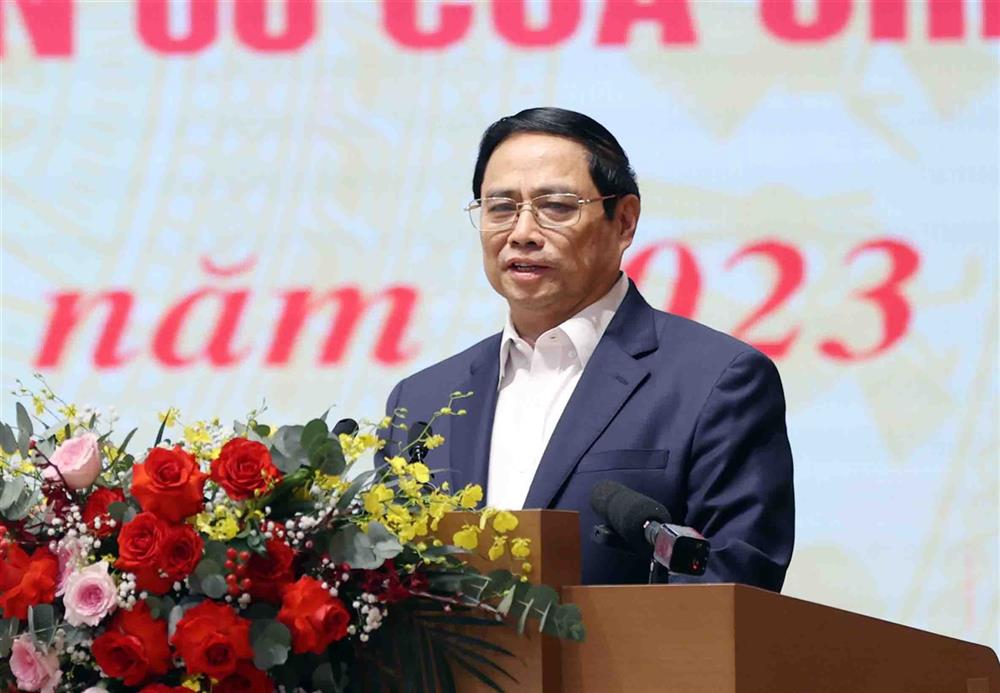During the “Conference on Reviewing the First 6 Months of 2023 on Digital Transformation and Government Project 06,” convened on July 12th, Prime Minister Pham Minh Chinh stressed the necessity of setting specific targets for the national digital transformation initiative.
Prime Minister Pham Minh Chinh highlighted the notable progress made in the country’s digital transformation efforts, particularly in enhancing awareness, refining institutional frameworks, bolstering infrastructure (especially data-related aspects), increasing financial investments, improving physical infrastructure, and advancing human resource development. These endeavors aim to improve public services and utilities for both citizens and businesses, thereby contributing to the nation’s development, fostering economic growth, and propelling industrialization and modernization.
Acknowledging the efforts and achievements of ministries, sectors, and localities, Prime Minister Chinh commended their dedication. He also recognized the significant leadership role of the National Committee on Digital Transformation, the pivotal contributions of the People’s Public Security force in executing Project 06, and the active participation and support of citizens and businesses throughout the digital transformation process.

In 2023, the focus is on “Establishing and Utilizing Data to Create New Value,” with the primary task being digitization, construction, connection, and sharing of data among ministries, sectors, and localities. This includes protecting personal data and leveraging data to better serve citizens and businesses. Therefore, the Prime Minister emphasized that digital transformation is an essential requirement that objectively demands further acceleration, overcoming barriers, bottlenecks, conservative mindsets, and fostering breakthroughs to bring tangible benefits to the people and the nation. This contributes to national development, industrialization, modernization, and fosters better growth, facilitating citizens and businesses in accessing public services.
Alongside the achieved results, the Prime Minister emphasized that these positive outcomes are just the beginning, and there is still dissatisfaction and numerous existing limitations, challenges, and obstacles. Many leaders of ministries, sectors, and localities have not regarded digital transformation as a priority task, showing insufficient concern, direction, and resource allocation for it. Many performance indicators lack information for evaluation, and even among those with evaluative data, some are difficult to fulfill.
To leverage the achieved results and address existing limitations and challenges, thereby successfully implementing the national digital transformation and Project 06, the Prime Minister stressed and firmly adhered to several guiding principles.

Leadership Perspective
To leverage the achieved results and address existing limitations, to successfully implement the national digital transformation and specifically Project 06, the Prime Minister emphasized and thoroughly adheres to some guiding viewpoints.
Identifying digital transformation as an inevitable trend, requiring objectivity and being determined as an important political task of the Party and the State, overcoming barriers, difficulties, and challenges, making further breakthroughs with a perspective that is national, comprehensive, and holistic, ensuring that no one is left behind but with priorities established. The Prime Minister outlines four priorities: prioritizing data development, building a “correct, sufficient, clean, living” database (data is a resource), prioritizing the development of online public services linked to people’s lives, business activities, and with a large coverage; prioritizing the development of platforms (especially national databases); prioritizing cybersecurity and information safety.
The Prime Minister emphasizes that building and developing the digital citizen ecosystem must be an important foundation of the national digital transformation. The digital economy is a significant driving force for Vietnam’s economic development. The digital society is one of the foundations of Vietnamese society. Digital culture is an integral part of the rich cultural heritage of the Vietnamese people.
Harmonizing interests among the State, citizens, and businesses; placing citizens and businesses at the center, as the focal point, targets, and driving force to better serve them. Having a strategic vision and continuously innovating from mindset, awareness, and actions to adapt to practical conditions; developing from provincial, regional, national scales to international scale while promoting international integration.
Mobilizing all resources and engaging the entire political system, citizens, and business community. Organizing the implementation of the national digital transformation at each ministry, sector, and locality must be substantive, bringing practical value to the government, citizens, and businesses, with the participation of the entire political system, citizens, and businesses.
National databases are new resources and crucial foundations for national digital transformation, hence they must be highly interconnected, interoperable, and shared among ministries, sectors, localities, between government levels, and between public and private sectors. The establishment of the National Data Center led by the Ministry of Public Security is an important solution to accelerate the formation, connection, and sharing of national databases in the future.
Empowering decentralization, delegation of authority, and individual accountability linked with appropriate resource allocation, enhancing the capacity of enforcement officials, strengthening inspection and supervision, emphasizing the responsibility of leaders in implementing Project 06 specifically and national digital transformation in general. Heads of ministries, sectors, and localities must regularly directly use online public services, digital products of their own ministry, sector, or locality; directly lead and promote digital transformation, implementing Project 06.
Project 06 is a key and crucial task of the national digital transformation; it requires mobilizing all resources and the participation of the entire political system, citizens, and business community. Establishing mechanisms to monitor and supervise the implementation of the National Population Database is essential. It is important to accelerate the implementation of certain pilot mechanisms and experiments to expand in the future. Leveraging proactive spirit, innovation, and daring to think and act for the common good is paramount.

The Central Task for the last six months of 2023

First and foremost, there must be resolute guidance and leadership to achieve significant breakthroughs in implementing the national digital transformation and Project 06. The approach is to view the national digital transformation as a monumental and strategic task, but one that must begin with specific actions and concrete goals, ensuring that each task is completed thoroughly and decisively.
- Ministers, sector leaders, secretaries, and chairpersons of local People’s Committees must provide even more determined guidance and exert greater effort to foster unity in both perception and action, harnessing the comprehensive strength of the entire political system in implementation.
- The Ministry of Information and Communications, in coordination with relevant ministries, sectors, and localities, should promptly initiate the establishment of a monitoring, tracking, and evaluation system for the national digital transformation at national, ministerial, sectoral, and local levels.
- The Ministry of Public Security, in collaboration with the Government Office, should promptly commence the establishment of a monitoring and evaluation system to oversee the implementation of the national population database, addressing bottlenecks, and urgently completing any outstanding tasks within the first six months of 2023

Secondly, there needs to be a focus on enhancing institutions, mechanisms, and policies for the national digital transformation in general and Project 06 in particular, with the pprinciple of consolidating multiple documents into one and applying streamlined processes. Institutions should take a proactive stance to accelerate the national digital transformation, making it faster and more sustainable.
- The Ministry of Information and Communications will lead and coordinate with the Ministry of Justice, the Ministry of Public Security, and relevant agencies to urgently synthesize, review, propose amendments, and supplements to align with the Law on Electronic Transactions (amended) recently passed by the National Assembly, to be completed by August 2023.
- The Ministry of Information and Communications will promptly review, amend, and supplement related documents to accelerate the use and development of the VnelD electronic identification platform. This includes utilizing VNeID electronic identities to establish new mobile subscriber accounts, issuing digital signatures associated with electronic identities, and amending Decree No. 130/2018/ND-CP of the Government on detailed regulations for implementing the Law on Electronic Transactions regarding digital signatures and digital signature authentication services in a streamlined manner.
- In addition, the Ministry will continue to lead and coordinate with the Ministry of Public Security and relevant agencies to expeditiously complete the planning for information and communication infrastructure for the period 2021-2030, with a vision to 2050. This includes proposing a decree to regulate the list of national databases, the establishment, updating, maintenance, and exploitation of national databases, to be completed by July 2023.

Furthermore, updating and issuing the Vietnam Government Electronic Architecture Framework (version 3.0) will be completed by September 2023.
- The Prime Minister has instructed the Ministry of Public Security to promptly research, develop, and submit to the National Assembly for the enactment of the Personal Data Protection Law. The Ministry of Justice will lead and coordinate with the Ministry of Public Security, the Supreme People’s Court, and the Supreme People’s Procuracy to organize the issuance of legal record certificates via the VnelD application.
- The Government Office will urge ministries, sectors, and localities to complete the implementation of 19 resolutions simplifying administrative procedures and citizen documents related to population management. This includes reviewing and amending documents and administrative procedures related to residency permits, serving as the basis for local public disclosure, implementation, and ensuring simplification of paperwork and citizen information submission while ensuring the authority of state agencies in accessing citizen data in compliance with personal data protection regulations.
- The Prime Minister has tasked ministries, sectors, and localities with focusing on reviewing, cutting, and simplifying regulations and administrative procedures related to investment, production, business activities, and citizens’ lives, ensuring a reduction of at least 20% in the number of regulations and a reduction of at least 20% in compliance costs according to the Government’s directives. There should be strict implementation of impact.
On the third point, it’s about further enhancing the efficiency of implementing online public services to facilitate citizens and businesses, shifting from passive to proactive.
Organize the implementation of two integrated public services: “Birth registration – permanent residence registration – issuance of health insurance cards for children under 6 years old” and “Death registration – cancellation of permanent residence registration – burial assistance fee subsidy nationwide”, with the spirit of simultaneously executing, refining, and upgrading.

Fourthly, to accelerate the application and deployment of digital platforms and specialized databases linked to the national population database in non-cash payments, e-commerce, etc., with the goal of completing the construction of the national database for civil servants by the end of 2023. Additionally, to promptly implement the database for social security to monitor the situation of unemployed workers and those seeking employment. Furthermore, to deploy biometric authentication technology on chip-embedded citizen identity cards at healthcare facilities to streamline procedures and serve passengers completing procedures for domestic flights at airports.
- The Ministry of Public Security, in coordination with relevant ministries, sectors, and localities, will intensify the issuance of level 2 or higher authenticated digital identities and promote the development of applications on the VNeID platform. By the end of 2023, at least 20 million citizens are targeted to use the VNeID platform with a minimum of 10 applications, aiming for a monthly growth rate of 3-5%.
- Efforts will be made to enrich information and integrate essential utilities into the VneID application. This will allow citizens to update their personal data on the system and authenticate various credentials such as educational qualifications, family relationships, driving licenses, bank accounts, utility bills, civil service positions, party membership, etc.
- Early research and testing will be conducted in some third-tier urban areas to synchronize the deployment of the VneID application. This includes data enrichment and the implementation of social management and utilities for citizens, such as crime reporting, fire prevention, traffic safety, environmental protection, temporary residence declaration, health records, birth certificates, marriage and divorce certificates, banking services, and services for vulnerable groups like the elderly, children, and individuals with contributions.
- The Ministry of Finance will lead coordination with the Ministry of Public Security to implement solutions for synchronizing tax data, using citizen ID cards and electronic identification as tax identification numbers and identifiers in electronic transactions to enhance tax collection efficiency. The goal is to ensure that 100% of businesses, particularly those in key sectors such as food and beverage, restaurants, hotels, entertainment services, supermarkets, and shopping centers, connect their electronic invoices generated from cash registers to the tax authority’s data system.

Fifthly, to enhance connectivity and data sharing among ministries, sectors, and localities to generate new values.
The Ministry of Public Security urgently conducts research and submits for approval to competent authorities the National Data Warehouse project to organize its implementation by the end of 2024. Early research and development will also be undertaken to establish a National Population Database Coordination Center (to specialize in processing, reconciling, cleansing, enriching, and authenticating data; data retrieval; data integration and sharing; deploying utilities for citizens and businesses; operating information hotline for inquiries, feedback, and suggestions…).

On the sixth point, there is a demand to enhance cybersecurity measures to safeguard information systems, databases, and personal data; mobilize resources for national digital transformation and Project 06 implementation; strengthen international cooperation and selectively learn from global experiences in digital transformation; and intensify communication efforts to foster social consensus.
With the closely aligned directives focused on key tasks and implementation directions for the latter half of 2023 as identified in the concluding remarks of the Prime Minister at the Conference, along with the active involvement of the entire political system and the enthusiastic response from the people and the business community, we can be fully hopeful that the national digital transformation and Project 06 will be successfully implemented at the national level. This will drive the development of a digital government, digital economy, digital society, and digital citizens.
Source: National Committee on Digital Transformation
play youtube,
xvideos,
xnxx,
xvideos,
porn,
xnxx,
xxx,
Phim sex,
tiktok download,
MÚSIC MP3,
sex,
Chopped Hazelnuts,
phim xxx,
hot sex,
mbbg,
As panteras,
Hentai anal,
Mexico Cancun Temperature,
porn,
American porn,
free brazzer,
jav,
hentai-gay,
Hentai 3d,
Porn vido vn,
hentai,
black horny old man eat pussy,
Hentai Sex,
brazzers brasil xxx brasileira,
Lavazza Instant Coffee,
tru kait,
Xem Phim Sex,
sex viet,
mp3play,
Panthers Georgia,
Bump Keys,
Mp3 Download,
sexlog,
save tik,
American porn,
German Open,
free porn xx,
sex mex,
mc mirella pelada,
Porn vido Br,
American porn,
Espn 49ers,
Ratify Treaties,
free fuck,
Rita Lee,
Argentine Vs Maroc,
phim xxx,
save tiktok,


 Tiếng Việt
Tiếng Việt
Block "blog" not found